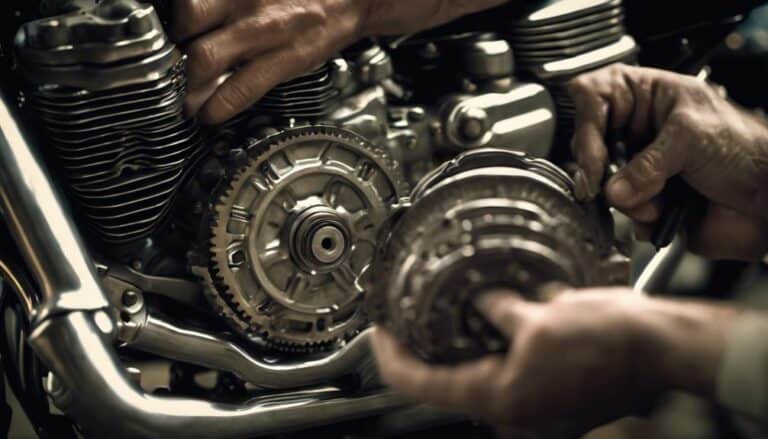With approximately 238,300 motorcycles affected globally, the Harley Davidson Clutch Recall 2018 raises concerns about safety and maintenance for riders. Upon hearing about this recall, you might wonder what models are impacted, how to identify symptoms of clutch malfunction, and what steps to take to ensure your motorcycle's safety.
Stay tuned to discover more about the background of the recall, the specific Harley-Davidson models involved, and crucial safety precautions to consider during this process.
Key Takeaways
- The recall addresses hydraulic clutch issues in 2017-2018 Harley-Davidson models.
- Symptoms include fluid loss, gear shifting problems, and clutch disengagement issues.
- Owners must verify if their motorcycle is affected and schedule a free assembly replacement.
- Following safety precautions and recall steps is crucial for preventing accidents and maintaining rider safety.
Background of the Clutch Recall
The background of the 2018 Harley-Davidson clutch recall traces back to a critical issue with the hydraulic clutch system's secondary actuator, which risked causing potential clutch failures on approximately 238,300 motorcycles worldwide. This problem stemmed from the secondary actuator leaking, leading to a domino effect that could result in clutch failure.
The first sign of trouble emerged after a crash in Korea, prompting a deeper investigation into the hydraulic system problem. As a response, Harley-Davidson initiated a massive recall that would cost the company an estimated $35 million to rectify. Owners of affected models from 2017 and 2018 were urged to visit authorized dealers to have a new secondary actuator piston assembly installed at no charge.
This proactive measure aimed to prevent any potential accidents or malfunctions due to the faulty hydraulic clutch system. Harley-Davidson took swift action to ensure the safety and satisfaction of its riders by addressing the issue promptly and effectively.
Impacted Harley-Davidson Models
Impacted models from Harley-Davidson's 2017-2018 lineup include Touring, Trike, CVO Touring, and select 2017 Softails. These models have been recalled due to safety concerns related to the clutch actuator piston assembly. The recall addresses the potential for an internal leak of fluid within the secondary clutch actuator, which could lead to malfunction and compromise rider safety. To rectify this issue, owners are advised to have a new secondary clutch actuator piston assembly installed at no cost by authorized dealers. This proactive measure aims to prevent accidents and ensure the well-being of riders. The affected models' owners are encouraged to promptly address this recall to maintain the integrity of their motorcycles and ride without worry. Below is a table detailing the models affected by the Harley-Davidson clutch recall 2018:
| Affected Models |
|---|
| Touring |
| Trike |
| CVO Touring |
| 2017 Softails |
Symptoms of Clutch Malfunction
Symptoms of a clutch malfunction in your Harley-Davidson motorcycle may manifest as potential loss of clutch fluid, leading to improper disengagement during gear shifting, starting in gear, or coming to a stop. These issues can be indicative of underlying problems with the hydraulic clutch system, particularly the clutch master cylinder or the secondary clutch actuator.
If you notice any abnormal behavior such as difficulty in shifting gears smoothly, the clutch failing to disengage properly, or a spongy feeling when engaging the clutch lever, it could be an indication of clutch issues. Addressing these symptoms promptly is crucial for your safety on the road.
The new recall specifically targets the secondary clutch actuator piston assembly to prevent control loss, ensuring that your Harley-Davidson motorcycle operates safely and efficiently. If you suspect your bike is experiencing these symptoms, contact Harley-Davidson to schedule the necessary recall service to rectify the problem and maintain optimal clutch performance.
Steps for Recall Process
To initiate the recall process for your affected Harley-Davidson motorcycle, follow these detailed steps provided by the manufacturer:
- Check Your VIN: Verify if your motorcycle is part of the recall by checking the Vehicle Identification Number (VIN). This unique code can usually be found on the motorcycle's frame or on registration documents.
- Contact Dealers: Reach out to authorized Harley-Davidson dealers to schedule an appointment for the recall service. The dealers will install a new secondary clutch actuator piston assembly free of charge.
- Global Recall: Understand that this recall affects a significant number of 2017-2018 Harley-Davidson bikes globally. It's crucial to address this issue promptly to ensure safety.
- Customer Service Assistance: For further information or assistance, contact Harley-Davidson customer service at 1-800-258-2464 or visit www.safercar.gov. They'll provide guidance and support throughout the recall process.
Safety Precautions and Handling Instructions
Regularly checking for fluid leaks or clutch disengagement issues is crucial to ensure the safety of your Harley-Davidson motorcycle. Failure to address clutch-related safety concerns promptly could potentially lead to accidents or malfunctions while riding your Road Glide or Road King.
To prioritize the safety of our riders, dealers will install the new secondary clutch actuator piston assembly free of charge for affected owners. It's essential to follow the instructions provided by Harley-Davidson for the clutch recall process diligently.
In the event that you notice any problems with your clutch, don't hesitate to reach out to Harley-Davidson customer service or the National Highway Traffic Safety Administration (NHTSA) for assistance. Addressing this issue promptly is vital to prevent any safety hazards while riding your motorcycle.
Conclusion
You've learned about the Harley Davidson Clutch Recall 2018 and the importance of addressing safety defects promptly.
Just like a well-oiled machine, ensuring your motorcycle's clutch is in top condition is essential for a smooth ride.
Remember to stay informed about recalls and follow safety guidelines to keep yourself and others on the road safe.
Ride on with confidence and peace of mind.

